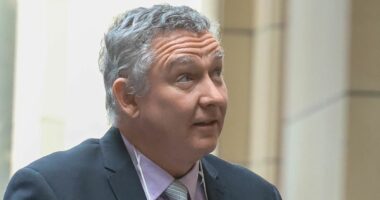Share this @internewscast.com
President Donald Trump is pictured signing executive orders in the White House’s Oval Office on Thursday, April 17, 2025, in Washington (AP Photo/Alex Brandon).
A federal judge, appointed by President Donald Trump, remains firm in his directive that the government must “facilitate” the return of a deported Venezuelan man to the United States.
The case involves Daniel Lozano-Camargo, 20, who was “wrongfully” deported to El Salvador, violating a legal settlement agreement designed to keep him in the U.S. while his asylum application was being processed by U.S. Citizenship and Immigration Services (USCIS).
Notably, the plaintiff has filed his case under the pseudonym “Cristian,” but Politico reported his full identity on Tuesday. Meanwhile, the court itself, in line with a prior order binding the parties, is continuing to use the pseudonym.
Last week, U.S. District Judge Stephanie Gallagher, who was appointed by Trump during his first term, cited contract law principles in a 19-page opinion directing the government to try and get Lozano-Camargo back stateside “so that he can receive the process he was entitled to under the parties’ binding Settlement Agreement.”
Love true crime? Sign up for our newsletter, The Law&Crime Docket, to get the latest real-life crime stories delivered right to your inbox.
On Monday, the government filed sealed arguments in an attempt to convince the judge to vacate her order. Along with those mysterious legal arguments, the government publicly filed a heavily redacted “Indicative Asylum Decision.”
The government’s public formal document explains why the Trump administration believes Lozano-Camargo’s underlying asylum claim will fail.
During a hearing on Tuesday, however, the judge said the asylum case is too far removed from the current legal dispute to be dispositive.
“I don’t think that this is a case about whether or not Cristian is going to eventually get asylum,” Gallagher said, according to a courtroom report by Politico. “Whether he ultimately receives asylum is not the issue. The issue is, and has always been, one of process.”
The issue, rather, is a 2024 settlement that limits how people who came to the country as unaccompanied minors can be deported, according to the judge. In Lozano-Camargo’s case, because he came to the U.S. when he was 17, that court-approved agreement means the government must wait until his asylum claim is extinguished.
“It is an axiomatic principle of contract law that when a defendant breaches a contract, that defendant must restore the situation that existed before the breach,” Gallagher wrote. “In the case of Cristian, this requires putting him in the position ‘to ensure that his case is handled as it would have been had he not been improperly sent to El Salvador.’ In other words, under contract law principles, Cristian, and any other Class Member who has been removed in violation of the Settlement Agreement, must be returned to the United States to await adjudication of his asylum application on the merits by USCIS.”
An accompanying April 23 order explains, in relevant part:
Defendants are hereby ORDERED to facilitate Class Member Cristian’s return to the United States to await the adjudication of his asylum application on the merits by USCIS under the terms of the Settlement Agreement. Facilitation includes, but is not limited to, a good faith request by Defendants to the government of El Salvador to release Cristian to U.S. custody for transport back to the United States.
In her Tuesday order, Gallagher denied outright the government’s motion to vacate the facilitation demand. At the same time, the judge issued a brief stay that will expire on Thursday afternoon — in just over 48 hours — to give the Trump administration time to file an appeal.
The government argued the “indicative” ruling foreclosed the need for Lozano-Camargo to be returned, because he wouldn’t be granted asylum even if he were returned. But the court was not swayed.
“It’s not a substitute for the process that was due,” the judge countered. “Process is important. We don’t skip to the end and say, ‘We all know how this is going to end up….’ My order requires that Cristian be returned to this country to get the process.”
The judge also previewed a possible series of next moves.
If the government is unsuccessful in getting the district court’s order overturned on appeal or stayed by the Fourth Circuit by the time the judge’s 48-hour stay is lifted, Gallagher said she would begin requiring the government to provide updates about the process of returning Lozano-Camargo to the U.S.
This, of course, tracks with the similar case of admittedly “wrongfully deported” Kilmar Armando Abrego Garcia, a 29-year-old father with protected status who was taken into custody by federal agents and quickly whisked away to CECOT along with Lozano-Camargo — despite court orders that he remain in the U.S. as well.
U.S. District Judge Paula Xinis, overseeing the Abrego Garcia case, has also directed the government to facilitate his return. Additionally, Xinis has instructed the government to provide daily updates about their progress in getting Abrego Garcia back to the country, and increasingly found efforts have been lacking.
Gallagher previously referenced the earlier case as instructive.
“[T]his Court is also guided by, and fully agrees with, the definition of ‘facilitate’; espoused by Judge Xinis and the United States Court of Appeals for the Fourth Circuit in Abrego Garcia,” the judge wrote last week. “Standing by and taking no action is not facilitation. In prior cases involving wrongfully removed individuals, courts have ordered, and the government has taken, affirmative steps toward facilitating return.”
















